 MyDogBreeds
MyDogBreeds Slovensky Hrubosrsty Stavac is originated from Slovakia but Dalmatian is originated from Croatia. Slovensky Hrubosrsty Stavac may grow 7 cm / 3 inches higher than Dalmatian. Both Slovensky Hrubosrsty Stavac and Dalmatian are having almost same weight. Both Slovensky Hrubosrsty Stavac and Dalmatian has almost same life span. Both Slovensky Hrubosrsty Stavac and Dalmatian has almost same litter size. Both Slovensky Hrubosrsty Stavac and Dalmatian requires Low maintenance.
Slovensky Hrubosrsty Stavac is originated from Slovakia but Dalmatian is originated from Croatia. Slovensky Hrubosrsty Stavac may grow 7 cm / 3 inches higher than Dalmatian. Both Slovensky Hrubosrsty Stavac and Dalmatian are having almost same weight. Both Slovensky Hrubosrsty Stavac and Dalmatian has almost same life span. Both Slovensky Hrubosrsty Stavac and Dalmatian has almost same litter size. Both Slovensky Hrubosrsty Stavac and Dalmatian requires Low maintenance.
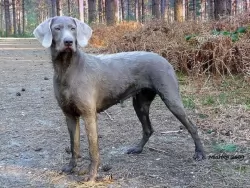 Breeding of the Slovak Hruborsty Stavac, fondly referred to as the SHS began around the 1940s.
Breeding of the Slovak Hruborsty Stavac, fondly referred to as the SHS began around the 1940s.
There were some dog lovers who were interested in crossing the coarse haired dogs of Slovakia with the German Wirehaired, the Czech blower and the Weimaraner. The outcome was a rough-haired kind of Weimaraner-looking dog.
While hunters and hunting were quite common in Slovakia, the breed became rather rare with the wars when hunting became less, but the dog was reconstructed by breeders, but is still rare outside Slovakia.
 The history of the Dalmatian dog is also fairly scant, and the information you get is often unclear.
The history of the Dalmatian dog is also fairly scant, and the information you get is often unclear.
The name Dalmatian wasn’t used until the end of the 18th century, although it seems as though, according to murals on ancient tombs, there were white hounds then with specks over the body.
It does seem firm that the modern Dalmatian is because of breeding of the English nobility. They used these dogs to accompany them on their carriages. The dogs were also bred with the purpose of getting an exquisite spotted pattern.
It was in 1890 that the first Dalmatian Club was established in England and the dog was recognized by the American Kennel Club in 1888.
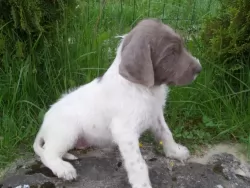 The dog is fairly large, standing at between 62 and 68cm in height and weighs 25 - 35kg. The coat is fairly coarse and dense and is a grey/silver shade with a touch of brown.
The dog is fairly large, standing at between 62 and 68cm in height and weighs 25 - 35kg. The coat is fairly coarse and dense and is a grey/silver shade with a touch of brown.
There is quite a bit of hair around the face. The ears are medium length and floppy and the tail is mostly docked to half its length but can be left long as well. The tail is set high and carried vertically and can be well feathered. The eyes are almond-shaped, and the dog has an intelligent appearance to him.
The Slovensky Hruborsty Stavac is a sharp dog, making it easy to have him trained and socialized. He is such a friendly, social dog, getting on well with all family members and loving to get involved with the games of the children.
There is no aggression in this dog and when you provide him with the exercise that he craves, he is loyal, gentle and loving, getting on well with other dogs as well.
 The Dalmatian is a medium sized dog with its beautiful white coat with black or liver spots being its main feature. The coat is short and dense and the Dalmatian pretty much sheds all year round.
The Dalmatian is a medium sized dog with its beautiful white coat with black or liver spots being its main feature. The coat is short and dense and the Dalmatian pretty much sheds all year round.
It is notable that at birth, the puppies are pure white, with their spots starting to form about 4 weeks later.
Both the male and female stand at anything between 56–61cm in height and weigh between 22 to 35kg. He is a slender, muscular dogs with plenty of stamina. The ears of the dog are floppy, he has brown eyes and a long tail.
With his human family, the Dalmatian is an active, playful dog. He has the reputation of being somewhat unfriendly and aloof, but many who have kept him as a pet say this isn't so. He loves to take part in games and gets on well with children in the home.
He is intelligent, but when it comes to strangers, the Dalmatian is reserved and even aloof. If you want to get the best from your Dalmatian, make sure that he is trained and socialized as he then knows how to behave well around people. He makes a good watchdog too.
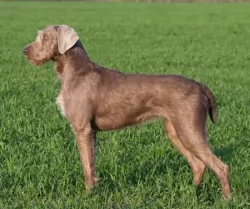 The Slovensky Hruborsty Stavac is such a bouncy, amicable pet, full of energy. He may appear to be confident and full of the joys but he secretly can’t stand it when his human family don’t include him in everything. He can actually suffer with separation anxiety.
The Slovensky Hruborsty Stavac is such a bouncy, amicable pet, full of energy. He may appear to be confident and full of the joys but he secretly can’t stand it when his human family don’t include him in everything. He can actually suffer with separation anxiety.
He is an athletic dog and will require lots of exercise – walks, hikes, ball games and running off his leash.
He is quiet but strong-willed and will respond well to a strong, firm, consistent, kind owner.
These dogs make the most awesome pets and you can either find one from a rescue group or find a puppy from a reputable breeder. Whatever you decide on, the Slovensky Hruborsty Stavac makes an extraordinary pet.
 The Dalmatian is such a beautiful dog, energetic and playful and he is good with pets and children in the home.
The Dalmatian is such a beautiful dog, energetic and playful and he is good with pets and children in the home.
He is intelligent too and training and socialization for him will be easy and promise to bring out all his good points.
The Dalmatian became popular in the 1800's when they were used as coach-dogs, and their popularity has been enhanced because of films from Hollywood such as ‘101 Dalmatians’.
Unfortunately many people receive Dalmatian puppies as gifts after seeing movies like this and then hand their dogs into rescue centers when they grow up and are no longer the cute little puppy they first met.
Be a responsible dog owner. A Dalmatian has feelings and you need to commit to caring for him for up to 15 years. You’ll be rewarded by having a wonderful, loyal canine friend.
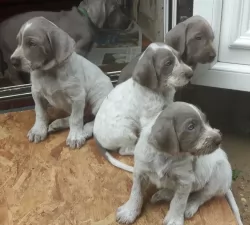 There are always some illnesses that your dog might get but which isn’t likely with your pet as these are healthy dogs.
There are always some illnesses that your dog might get but which isn’t likely with your pet as these are healthy dogs.
Dogs can die within a few hours if not treated with this ailment. Bloat is a condition where the stomach twists and fills with gas. The stomach is swollen and the gas can cause breathing problems because it puts pressure on the diaphragm. If you suspect that your dog has bloat, he should be rushed to the vet as soon as possible.
 Dalmatians, with good care, can live to be about 10 to 15 years. However, just as with other breeds, the Dalmatian is prone to certain health problems that are more specific to their breed. Some of these problems are skin allergies, deafness and urinary stones.
Dalmatians, with good care, can live to be about 10 to 15 years. However, just as with other breeds, the Dalmatian is prone to certain health problems that are more specific to their breed. Some of these problems are skin allergies, deafness and urinary stones.
Dalmatians are known to have sensitive skin and they are prone to topical allergies. When you brush your dog, you should check his skin for redness and also check for fleas and ticks.
Red bumps on his skin could mean an allergy and can be distressing for your pet. Your pet may be scratching excessively and the skin may be red and moist with runny, itchy eyes. It is time to get your dog to the vet, who may prescribe an antihistamines to get the itching and allergies under control.
Unfortunately, the Dalmatian is a dog which has a tendency to form stones in the kidneys and bladder. A genetic mutation causes the raised uric acid levels which is more prevalent with the male Dalmatian. Straining to urinate can be tremendously stressful for your dog and you will need to get him to the vet immediately.
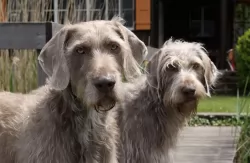 Before you bring your pet home, dog-proof your house. It won’t be fair to leave tempting, chewy things lying around and expect your pet to not be interested in them. Also, keep dangerous chemicals out of reach of your pet.
Before you bring your pet home, dog-proof your house. It won’t be fair to leave tempting, chewy things lying around and expect your pet to not be interested in them. Also, keep dangerous chemicals out of reach of your pet.
Prepare for your pet beforehand and have feeding- and water bowls ready as well as a nice basket or some other sleeping equipment available for him.
If you’re bringing an adult rescue dog home, try to feed him the same kind of food he was already eating, as too many changes can upset him. When he settles down, you can move over to other food. Keeping his food consistent can avoid digestive problems.
If you opt to feed him one of the commercially manufactured dog foods, make sure its the best quality as some of them are bad, filled with things such as colorants, preservatives and fillers. Try and give him some homemade food which you can add into the dry kibble twice a week. Boiled chicken, brown rice or pasta and spinach, sweet potatoes and carrots all boiled slowly together will delight your pet. Chop it all up and your pet will look so forward to this. Dogs thrive on simple, consistent meals like this. Provide water at all times.
The amount of exercise any dog needs is dependent on age, size and energy levels. Because the Slovensky Hruborsty Stavac is an energetic breed, he will need a good dose of exercise. If you have a puppy, avoid strenuous exercise as this can damage the soft, developing bones and joints. As well as walks and ball games, mental stimulation is also important for this dog. Consider buying some puzzle toys or feeders for your pet.
Keep up to date with all your dog’s immunizations and get your pet to the vet as soon as he is sick. There are some illnesses such as bloat which can claim your pet’s life in just a few hours if not attended to.
 The Dalmatian is an easy dog to maintain and brushing twice a week will get rid of loose hairs. What is notable with the Dalmatian is that not only does he look like a well groomed dog, he also doesn’t have that typical dog smell around him.
The Dalmatian is an easy dog to maintain and brushing twice a week will get rid of loose hairs. What is notable with the Dalmatian is that not only does he look like a well groomed dog, he also doesn’t have that typical dog smell around him.
No matter what kind of dog you have, a high-quality dog food is always beneficial for your dog’s health. Home-made food is always good for your dog and wholesome food such as brown rice, vegetables and some cooked chicken will delight your pet and keep him interested in his food.
There are also excellent manufactured foods and kibble is a good food to have when you select it according to your dog’s age and energy levels.
These foods, especially the top quality ones, ensure your pet gets all the nutrients he needs. Adding some raw meat into the diet can be highly beneficial for your pet and will keep him bright eyed, bushy tailed and with a wet nose.